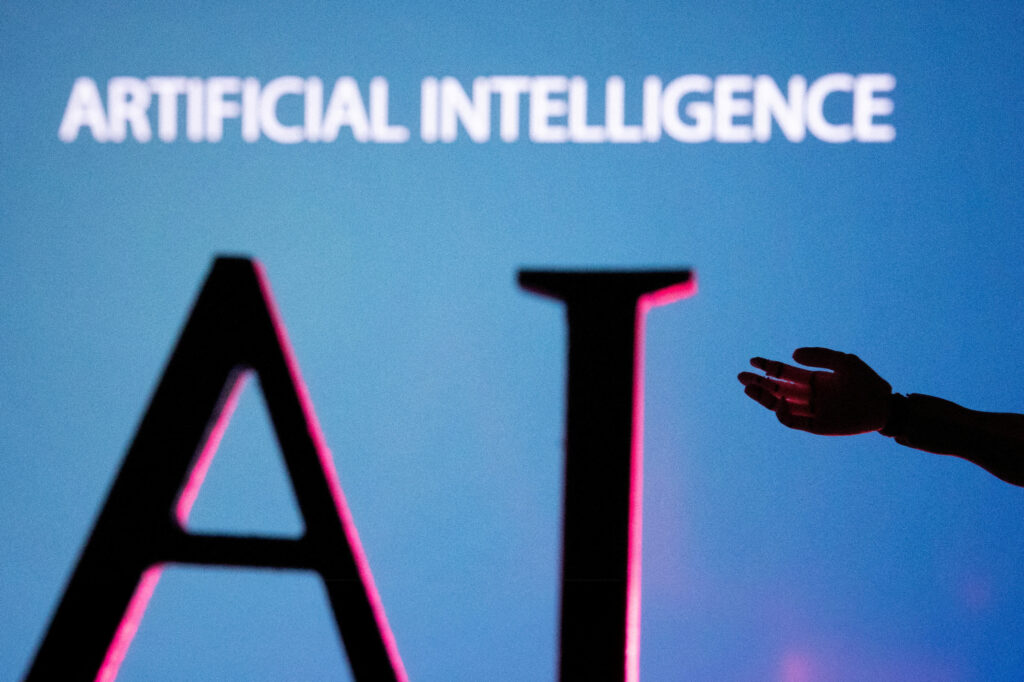
FILE PHOTO: AI (Artificial Intelligence) letters and robot hand miniature in this illustration taken, June 23, 2023. REUTERS/Dado Ruvic/Illustration/File Photo
SAN FRANCISCO—OpenAI unveiled a marketplace on Monday that enables users to access personalized artificial intelligence “apps” for tasks like teaching math or designing stickers, signaling an ambition to expand its consumer business.
OpenAI CEO Sam Altman shared the updates at the AI lab’s first developer conference, which attracted 900 developers from around the world and marked the company’s latest attempt to capitalize on the popularity of ChatGPT by offering incentives to build in its ecosystem.
ChatGPT, launched in November 2022, now has 100 million weekly active users, Altman said.
OpenAI is calling the customized AI apps “GPTs”, which the company said are early versions of AI assistants that perform real-world tasks, such as booking flights, on behalf of a user.
It will launch a GPT Store later this month where people can share their GPTs and earn money based on the number of users. It’s a renewed effort from the company’s failed attempts to build an ecosystem of ChatGPT plugins earlier this year.
“Eventually, you’ll just ask the computer for what you need, and it’ll do all of these tasks for you,” Altman said in his keynote speech at the event in San Francisco.
“We really believe that gradual iterative deployment is the best way to address the safety challenges of AI. We think it’s especially important to move carefully towards this future.”
In addition to GPTs, OpenAI also released a slew of developer-focused updates, including significant cost slashing, an announcement met with loud cheers from the audience.
‘HUGE BOOM’
Even before attendees were allowed to check in early Monday morning, hundreds had lined up around the block in the Mid-Market neighborhood of San Francisco. Most were developers already using OpenAI technology who wanted updates.
The YouTube live stream of Altman’s speech attracted more than 40,000 viewers, and some even set up watch parties.
For its 2 million developers, OpenAI announced a new GPT-4 Turbo model, which compared to its predecessor GPT-4 is several orders of magnitude cheaper and processes much more data.
It unveiled assistant application programming interfaces (APIs) with vision and image modalities, confirming a Reuters report. It also launched a beta program for developers to fine-tune GPT-4 models.
“It’s a huge boom for startups like us. All of a sudden, our costs went down by a factor of three X, which is huge,” said Flo Crivello, the founder of AI assistant startup Lindy and one of the attendees at the conference.
Crivello also acknowledged Lindy could be competing with OpenAI’s upcoming GPT bots, calling his startup’s relationship with OpenAI “complicated.”
Speaking to the media on Monday, Altman warned startups using OpenAI’s technology against building applications that only have simple integrations with OpenAI.
“We are planning to build the obvious features,” he said. “But there’s enormous value to building a deeper integration on top of OpenAI.”
Altman said he envisions a future where each person has multiple GPTs that can work together to accomplish tasks on their behalf.
OpenAI wants more enterprises and developers to build models to rival those developed by Anthropic and Alphabet’s Google, and open source models such as Meta Platforms’ Llama. It also competes for enterprise customers with Microsoft.
Satya Nadella, the CEO of OpenAI backer Microsoft, made a brief, surprise appearance at the conference, reiterating his support for the expensive race in building foundation models. Microsoft has invested more than $10 billion in OpenAI.
“We commit ourselves deeply to making sure you all, as builders of these foundation models, have not only the best systems for training and inference, but the most compute so that you can keep pushing forward on the frontier,” he said.
To address the concerns of big enterprises, OpenAI launched its Custom Models program, offering to create custom GPT-4 models at an “expensive” price.
It matched offers from Google and Microsoft to cover any legal costs incurred by claims around copyright infringement for enterprise users.
READ MORE:
Musk to integrate xAI with social media platform X